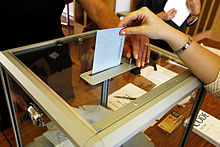Democracy
Democracy (ancient Greek δημοκρατία dēmokratía "rule of the people of the state", from δῆμος dḗmos "people of the state" and κράτος krátos "violence, power, rule") today refers to forms of rule, political orders or political systems in which power and government emanate from the people (popular rule).
The people are involved either directly (direct democracy) or through the selection of decision-making representatives (representative democracy) in all decisions that have a binding effect on the general public. In democratic states and political systems, the government emerges from the people through political elections. Since power is exercised by the general public, freedom of speech and freedom of the press are essential to the formation of political will. Other important features of a modern democracy are free, secret and equal elections, the majority or consensus principle, protection of minorities, acceptance of a political opposition, separation of powers, constitutionality, and protection of fundamental, civil and human rights. This liberal value basis, which as such cannot be touched even by majority decision, also distinguishes it substantially from an ochlocracy, people's republic or tyranny of the majority.
Many of the existing democracies basically call themselves republics, whereby republics do not have to be democracies, but merely define themselves in a departure from monarchy. But modern monarchies have also become compatible with the concept of democracy in many respects - thus mixed forms of state such as the parliamentary monarchy have emerged, which combine decisive elements of a democracy.
There are different ways of measuring democracy. According to the 2020 Democracy Index, around 8.4 % of the world's population live in "complete democracies", 41.0 % in "incomplete democracies", and the rest in partially democratic (partly authoritarian) systems or autocracies.

Voting in the second round of the presidential election in France 2007

Plenary session hall of the German Reichstag, elected according to what was then considered progressive universal and equal male suffrage (1889 at Leipziger Straße 4 in Berlin)
Term History
The word "democracy" is derived from the ancient Greek δημοκρατία "rule of the people of the state", a compound of δῆμος dēmos "people of the state" and κρατός kratós "rule". It originated in ancient Greece, where it meant direct rule by the people. The term "people" was used very narrowly in those times, as it was used to grant political participation rights to only an extremely limited group of citizens. Thus, in a Greek polis, only free men could participate in popular assemblies. The departure from the basic idea of democracy was called ochlocracy ("rule of the mob").
Essential features of democracy
A state is considered democratic if the following criteria apply:
- There is a demos (the people) who make political decisions through collective procedures (elections or votes).
- The people is the sovereign bearer of state power (popular sovereignty). It gives itself (usually through a constitution) a political system (constitutional power).
- There is a territory in which decisions are applied domestically and in which the demos is located: the territory of the state. Because this usually corresponds to the home of the demos, the demos and the scope of the democratic process coincide. Colonies of democracies are not considered democratic even if they are ruled by the democratic mother country. (Demos and territory do not coincide). If, however, the population of a territory is (even significantly) larger than the demos (problem of foreigners in elections), it is still generally spoken of as a democracy.
- There is a decision-making procedure for political norms that functions either directly (as a referendum) or indirectly (via the election of a representative parliament). This procedure is already considered legitimate by the demos by the fact that its outcome is "accepted". In a representative democracy, the political legitimacy of the representatives is derived from the willingness of the population to accept or acquiesce in the decisions of the state (including those of the government and the courts) against individual preferences and interests. This is important because democratic elections always have winners and losers. At the very least, the procedure must be capable of bringing about changes in government, provided there is sufficient support for it. Sham elections, which can only confirm an existing regime, are not democratic.
- In the case of nation states, they must be sovereign: Democratic elections are useless if an outside authority can overrule the result. There can be exceptions in the case of sovereignty (example Iceland).
- Finally, an indispensable feature of a democracy is that recurring, binding procedures allow the government to change without revolution (multiparty system, parliamentary opposition). In predominantly direct-democratic systems, the people decide for themselves on substantive issues, for example, by means of referendums and cooperative planning. In representative democracies, representatives are elected by the citizens (or in the past also chosen by lot) to exercise rule.
Although the state form of democracy does not necessarily include this by definition, it is usually associated with some form of rule of law in the external, modern, primarily Western image (see also corresponding section). At least to be mentioned here are:
- Guarantee of the fundamental rights of each individual vis-à-vis the State, vis-à-vis social groups (especially religious communities) and vis-à-vis other individuals.
- Separation of powers between the organs of state: government (executive), parliament (legislative) and courts (judicial).
- Freedom of expression, of the press and of broadcasting.
Questions and Answers
Q: What is democracy?
A: Democracy is a form of government where power is in the hands of the people.
Q: How can democracy be implemented?
A: Democracy can be implemented through direct democracy, representative democracy, referendums, and random selection.
Q: What is direct democracy?
A: Direct democracy is when people meet to decide about new laws and changes to existing ones. It is usually only used in small countries or towns because modern populations are too large for this type of decision-making.
Q: What is representative democracy?
A: Representative democracy is when the people elect their leaders who then take decisions about laws on their behalf. Elections are either held periodically or when an officeholder dies.
Q: What does a referendum involve?
A: A referendum involves people voting on proposed new laws or changes to existing laws.
Q: When do juries typically come into play?
A: Juries are commonly chosen more or less at random for trials involving serious crimes in Europe. However, many legal cases that are not related to criminal matters do not involve juries and decisions are made by a judge or judicial panel instead.
Q: How does a dictatorship differ from a democratic government?
A: A dictatorship involves power being concentrated in the hands of one person while democracies involve power being shared among the people through various forms of decision-making processes such as elections and referendums. Dictatorships also tend to act against freedom of expression whereas democracies promote it as part of their governing principles.
Search within the encyclopedia